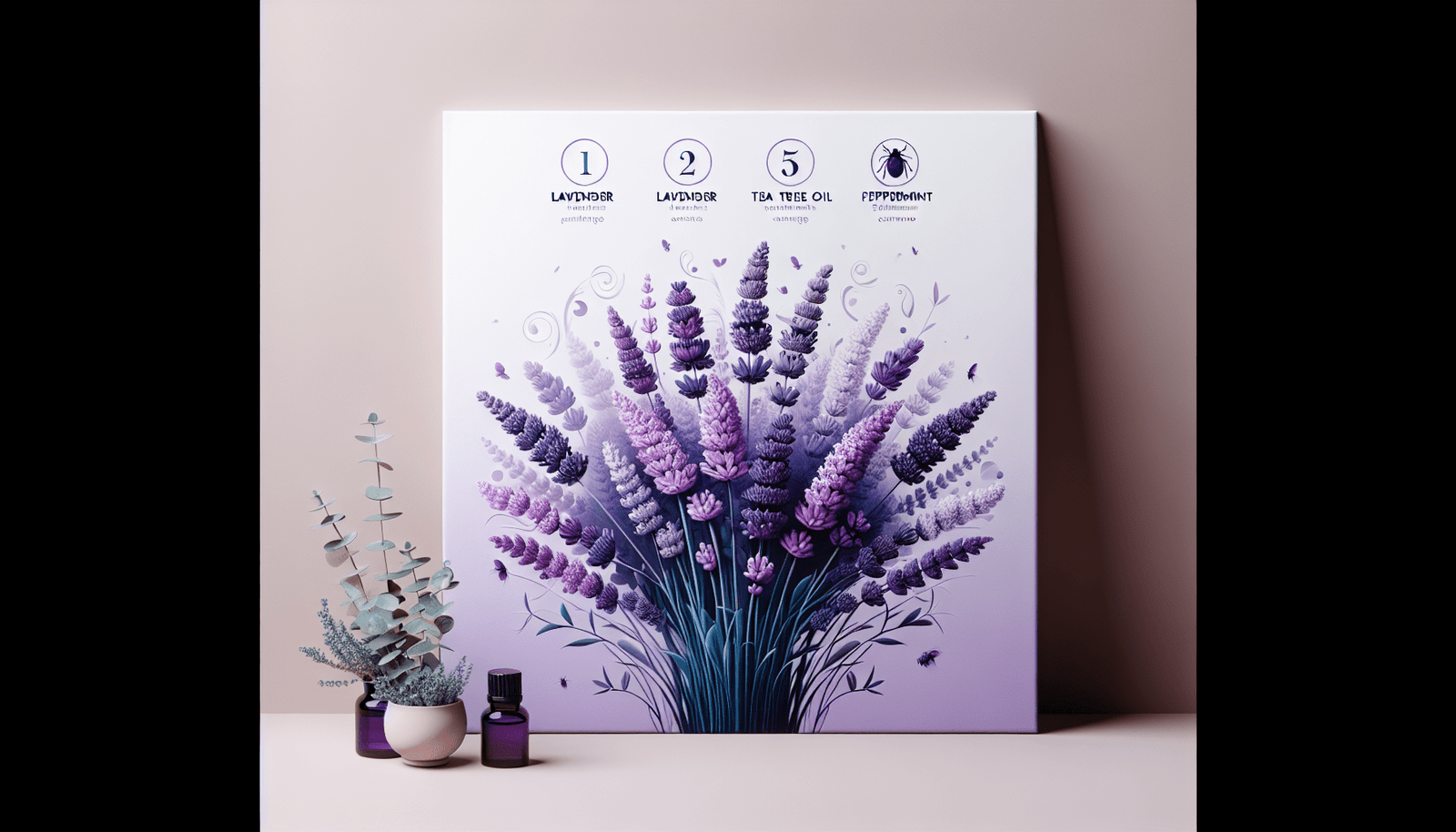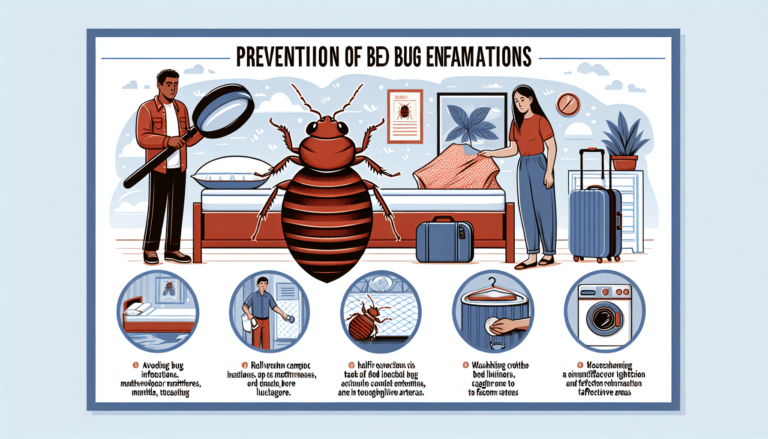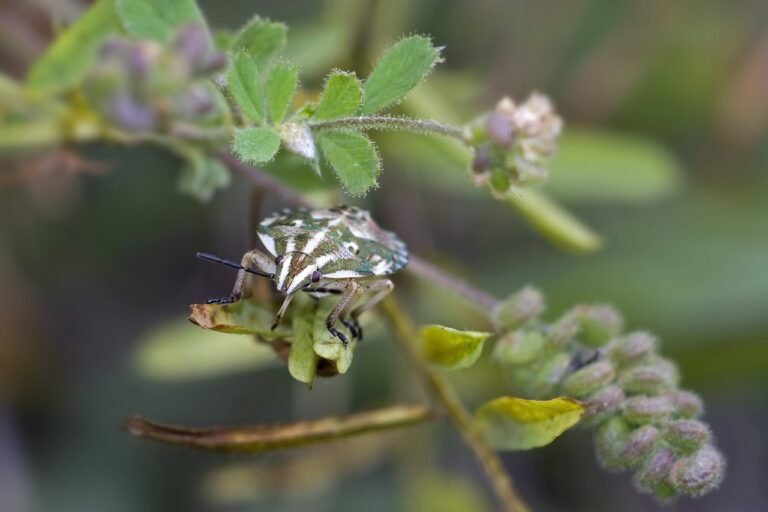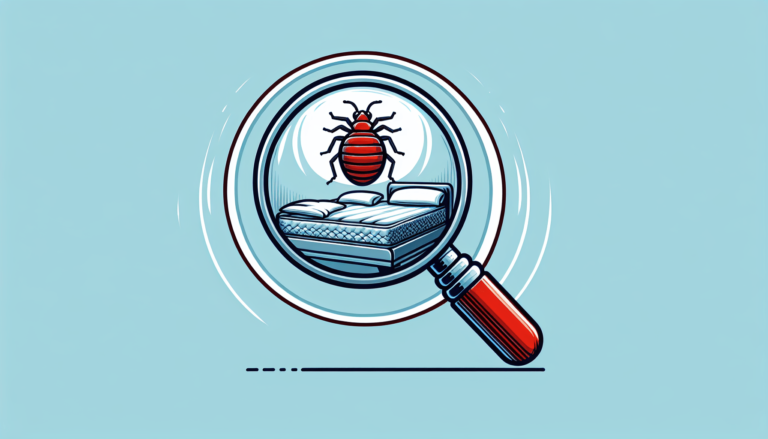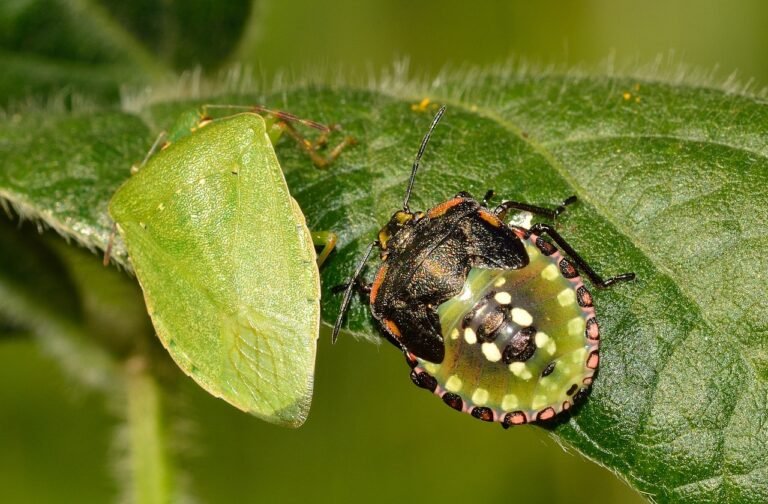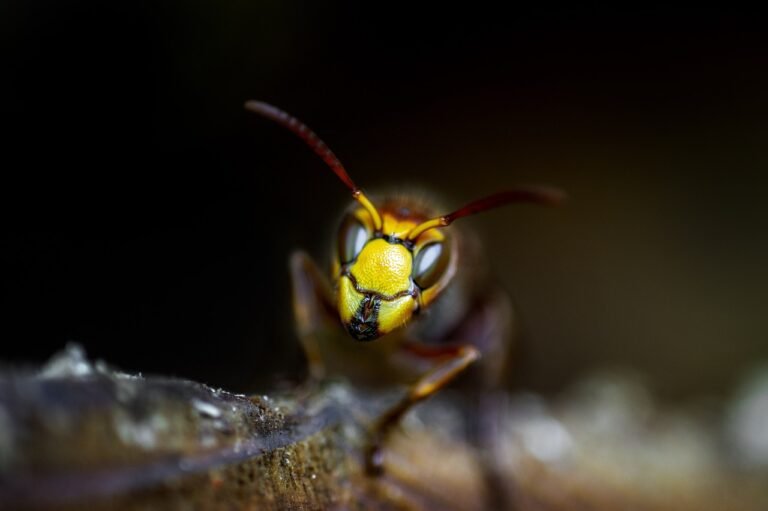Top 5 Smells That Bed Bugs Hate for Effective Elimination
This article explores the top 5 smells that bed bugs hate, providing valuable insights and information for those seeking effective elimination methods. As a subject expert with a lifetime of experience dealing with bed bugs, I’ll be sharing my expertise and knowledge in this article. Utilizing a conversational tone, real-life examples, and a storytelling approach, I aim to engage readers and deliver content that is easy to understand. By taking a comprehensive approach and incorporating lists, stats, facts, and data, this article will serve as a go-to resource for bloggers, journalists, website owners, and anyone seeking accurate and helpful information on this topic. From the hook that captures the reader’s attention to the solution that addresses their problem, every aspect of this article is designed to provide value and drive a significant amount of traffic.
Understanding Bed Bugs
Bed bugs are small insects that feed on human blood and are a common household pest. These pests are nocturnal and typically hide in cracks and crevices during the day, making it difficult to detect and eliminate them. Understanding the life cycle, habits, and effects of bed bug infestations is crucial in effectively controlling and eliminating these pests.
Description of Bed Bugs
Bed bugs are small, oval-shaped insects that are typically reddish-brown in color. They are about the size of an apple seed, with flat bodies that allow them to hide in tiny spaces. Bed bugs do not have wings but are adept at crawling and hitchhiking on luggage, clothing, and other items, which enables them to spread easily from one location to another.
Life Cycle and Habits of Bed Bugs
Bed bugs go through a life cycle that consists of egg, nymph, and adult stages. Female bed bugs can lay hundreds of eggs during their lifetime, which can hatch within days. The nymphs, or baby bed bugs, go through several molts before reaching adulthood. The entire life cycle of a bed bug can take anywhere from four to six weeks, depending on environmental factors such as temperature and availability of food.
Bed bugs are primarily active at night and are attracted to the warmth and carbon dioxide emitted by sleeping humans. They feed by piercing the skin and drawing blood, leaving behind itchy, red bite marks. After feeding, bed bugs retreat to their hiding spots, often in mattresses, box springs, bed frames, and other furniture.
Effects of Bed Bug Infestations
Bed bug infestations can have several negative effects on individuals and households. The primary concern is the physical discomfort caused by the bed bug bites, which can lead to itching, swelling, and secondary skin infections due to scratching. Additionally, the psychological impact of living with bed bugs can be significant, causing high levels of stress, anxiety, and sleep disturbances.
Bed bug infestations can also result in financial implications, as the costs associated with professional pest control treatments and replacing infested furniture can add up. Furthermore, bed bugs are notoriously difficult to eliminate, and their resilience and ability to hide in hard-to-reach places can make eradication a lengthy and frustrating process.
Bed Bugs’ Sense of Smell and Detection Methods
Bed bugs have a highly developed sense of smell, which plays a crucial role in their detection and eradication. Bed bugs are attracted to the carbon dioxide and body heat emitted by humans, allowing them to locate potential hosts. They also release pheromones, which act as chemical signals for communication and aggregation among bed bugs.
Several methods can be used to detect bed bugs and confirm their presence. Visual inspection of typical hiding spots, such as mattresses, bed frames, and furniture seams, can uncover signs of bed bug activity, including live bugs, shed skins, fecal stains, and blood smears. The use of monitoring devices, such as bed bug interceptors and bed bug traps, can also aid in identifying an infestation.
To effectively eliminate bed bugs, it is essential to employ a multifaceted approach that combines various detection methods, thorough cleaning, and targeted treatment strategies. Furthermore, the use of natural repellents, such as lavender oil, tea tree oil, peppermint oil, neem oil, and citronella oil, can enhance the effectiveness of bed bug control methods.
Lavender Oil
Lavender oil, derived from the flowers of the lavender plant, is known for its pleasant smell and various therapeutic properties. This essential oil is widely used in aromatherapy and is also believed to have repellent properties against bed bugs.
Introduction to Lavender Oil
Lavender oil has a distinct floral scent and is commonly used in perfumes, soaps, and candles. It is extracted through steam distillation from the flower spikes of the lavender plant, primarily grown in Mediterranean regions. Lavender oil is known for its calming and relaxing effects on the mind and body, making it a popular choice in aromatherapy practices.
Effect of Lavender Oil on Bed Bugs
While lavender oil is widely known for its pleasant aroma, its effect on bed bugs is not fully understood. Some studies suggest that lavender oil may act as a natural repellent for bed bugs, potentially deterring them from infested areas. The strong scent of lavender oil may disrupt the bed bugs’ sense of smell, making it harder for them to locate potential hosts.
However, it is important to note that lavender oil may not be effective as a standalone treatment for severe bed bug infestations. It should be used as part of a comprehensive approach that includes proper cleaning, thorough vacuuming, and targeted pesticide applications.
How to Use Lavender Oil for Bed Bug Elimination
To use lavender oil for bed bug elimination, several methods can be employed. One common approach is to create a homemade bed bug spray by mixing a few drops of lavender oil with water in a spray bottle. This solution can be sprayed onto infested areas, such as mattresses, furniture, and baseboards, to repel bed bugs.
Another method is to place lavender-infused sachets or essential oil diffusers near beds and furniture to create a scent barrier that may discourage bed bug activity. Additionally, adding a few drops of lavender oil to laundry detergent when washing bed linens and clothing can help deter bed bugs.
Safety Precautions with Lavender Oil
While lavender oil is generally considered safe for topical and aromatic use, it is essential to follow safety precautions when using it for bed bug elimination. Individuals with sensitive skin or respiratory conditions should exercise caution and consider conducting a patch test before using lavender oil extensively.
Furthermore, it is crucial to use high-quality, pure lavender oil to ensure its effectiveness and minimize the risk of adverse reactions. Diluting the lavender oil with a carrier oil, such as coconut oil or almond oil, can also help reduce the risk of skin irritation.
In conclusion, lavender oil may have some repellent properties that can aid in bed bug control efforts. However, it should be used as part of a comprehensive approach and in conjunction with other proven methods for effective elimination of bed bugs.
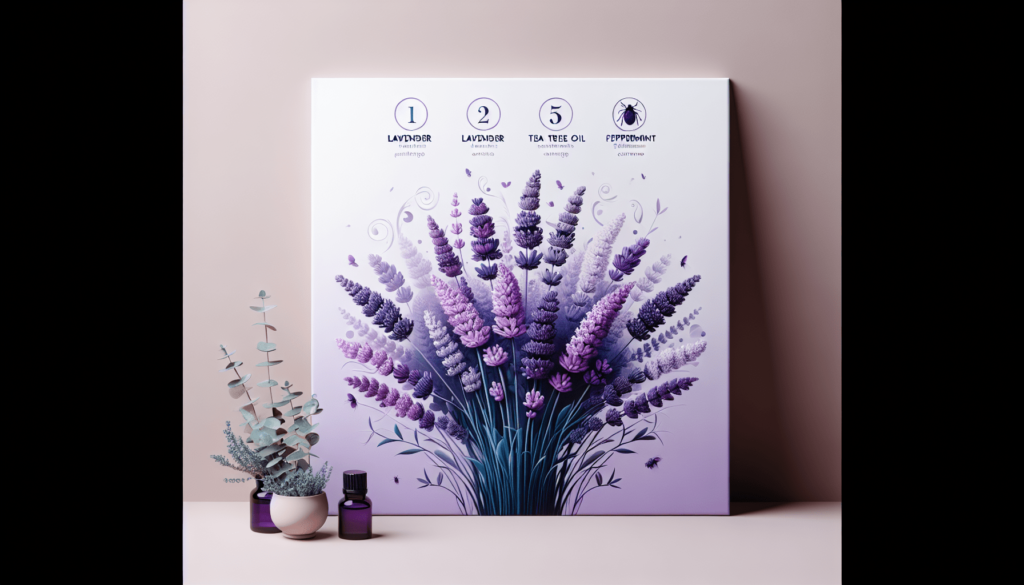
Tea Tree Oil
Tea tree oil, derived from the leaves of the tea tree plant, is renowned for its antiseptic and medicinal properties. This essential oil is known to have various insecticidal properties, including potential repellent effects on bed bugs.
Overview of Tea Tree Oil
Tea tree oil, also known as melaleuca oil, has a strong, medicinal scent and is widely used in natural remedies and skincare products. It is extracted through steam distillation from the leaves of the tea tree plant, native to Australia. Tea tree oil possesses antimicrobial, antifungal, and insecticidal properties, making it a versatile and popular choice in natural pest control.
Effects of Tea Tree Oil on Bed Bugs
Studies have shown that tea tree oil exhibits insecticidal properties, affecting the physiology and behavior of bed bugs. It is believed that the strong scent of tea tree oil can repel bed bugs and interfere with their ability to locate hosts. The oil’s components, such as terpinene-4-ol and cineole, are thought to have insecticidal effects and could potentially damage the bed bugs’ nervous system.
However, as with lavender oil, tea tree oil should not be solely relied upon to eliminate severe bed bug infestations. It is most effective when used in conjunction with other proven control methods.
Steps to Use Tea Tree Oil Against Bed Bugs
To utilize tea tree oil for bed bug control, several approaches can be taken. One method is to dilute tea tree oil with water or a carrier oil, such as olive oil or jojoba oil, and apply it directly to infested areas using a cotton ball or cloth. This can include mattresses, furniture, and cracks and crevices where bed bugs may hide.
Another option is to create a tea tree oil spray by mixing a few drops of tea tree oil with water in a spray bottle. This solution can be sprayed onto infested areas and regularly reapplied as part of a comprehensive bed bug control plan.
Precautions for Using Tea Tree Oil
Tea tree oil is generally considered safe for topical use, but precautions should be taken to minimize the risk of adverse reactions. It is essential to use high-quality, pure tea tree oil and avoid ingesting it, as it can be toxic when swallowed.
Individuals with sensitive skin should dilute tea tree oil before applying it topically and conduct a patch test to assess any potential allergic reactions. It is also recommended to avoid using tea tree oil in excess or in high concentrations, as this can irritate the skin and respiratory system.
In summary, tea tree oil may have insecticidal and repellent effects on bed bugs. However, it should be used as part of a comprehensive bed bug control strategy and in combination with other proven methods for optimal results.
Peppermint Oil
Peppermint oil, derived from the peppermint plant, is well-known for its refreshing scent and various medicinal properties. This essential oil is also believed to have insecticidal effects on bed bugs.
Description of Peppermint Oil
Peppermint oil has a strong, minty aroma and is commonly used in aromatherapy and natural remedies. It is extracted through steam distillation from the leaves of the peppermint plant, a hybrid between watermint and spearmint. Peppermint oil contains high levels of menthol, which gives it its characteristic scent and cooling sensation.
Significant Effects of Peppermint Oil on Bed Bugs
Peppermint oil is believed to have insecticidal effects on bed bugs, primarily due to its strong scent and active components, such as menthol and pulegone. The powerful aroma of peppermint oil can disrupt the bed bugs’ sense of smell and potentially repel them from infested areas.
Some studies have shown that peppermint oil can interfere with the respiratory system of bed bugs and induce respiratory distress, potentially leading to their death. However, it is important to note that the effectiveness of peppermint oil may vary depending on the concentration used, the severity of the infestation, and other environmental factors.
Procedure for Applying Peppermint Oil to Get Rid of Bed Bugs
To utilize peppermint oil for bed bug control, several methods can be employed. One common approach is to create a peppermint oil spray by diluting a few drops of peppermint oil with water in a spray bottle. This solution can then be sprayed onto infested areas, such as mattresses, furniture, and carpeting, to repel bed bugs.
Another method is to soak cotton balls or tissues in peppermint oil and strategically place them around infested areas or in cracks and crevices where bed bugs may hide. The scent of the oil will permeate the surroundings and potentially discourage bed bug activity.
Additionally, using peppermint oil-infused cleaning products, such as floor cleaners or laundry detergents, can help deter bed bugs and prevent their spread during routine cleaning.
Things to Consider While Using Peppermint Oil
While peppermint oil may have insecticidal effects on bed bugs, there are a few precautions to keep in mind. Peppermint oil is highly concentrated and can cause skin irritation or allergic reactions in some individuals. It is important to dilute the oil properly and conduct a patch test before using it extensively.
Furthermore, peppermint oil should be used in moderation and not applied directly to the skin, especially in sensitive areas. If ingested in large amounts, peppermint oil can have adverse effects, including digestive issues and respiratory distress. It is essential to use peppermint oil as directed and consult a healthcare professional if any adverse reactions occur.
In conclusion, peppermint oil may have potential insecticidal effects on bed bugs, primarily through its strong scent and active components. However, it should be used alongside other control methods as part of a comprehensive approach to eliminate bed bug infestations effectively.

Neem Oil
Neem oil, derived from the seeds of the neem tree, is known for its various medicinal, pesticidal, and insecticidal properties. This natural oil is believed to have repellent effects on bed bugs and can be used as part of an integrated pest management approach.
Understanding Neem Oil
Neem oil is a yellowish-brown oil extracted from the seeds of the neem tree, native to the Indian subcontinent. It has a strong, pungent odor and contains numerous compounds, such as azadirachtin, which give it its insecticidal and medicinal properties. Neem oil has been used for centuries in traditional medicine and pest control practices.
Impact of Neem Oil on Bed Bug Infestations
Neem oil is known to have repellent effects on a wide range of insects, including bed bugs. The strong scent and bitter taste of neem oil are thought to disrupt the feeding and mating behaviors of bed bugs, making it harder for them to establish and sustain infestations.
Furthermore, the active compounds in neem oil have been shown to have insecticidal effects on other pests, such as mosquitoes, ants, and cockroaches. While more research is needed to fully understand the specific mechanisms of neem oil on bed bugs, its potential as a natural repellent is promising.
Instructions for Using Neem Oil as a Bed Bug Repellent
To utilize neem oil for bed bug control, several methods can be employed. One option is to dilute neem oil with water or a carrier oil, such as coconut oil or almond oil, and apply it directly to infested areas using a cloth or sponge. This can include bed frames, furniture, and baseboards.
Another approach is to create a neem oil spray by mixing a few drops of neem oil with water and a small amount of liquid soap or detergent. This solution can be sprayed onto infested areas and potential hiding spots, such as cracks and crevices, to repel bed bugs and inhibit their reproduction.
Additionally, incorporating neem oil into regular cleaning routines by adding a few drops to laundry detergent or floor cleaners can help deter bed bugs and prevent their spread.
What to Be Aware of When Using Neem Oil
While neem oil is generally considered safe and non-toxic to humans and pets, there are a few considerations to keep in mind. Neem oil may cause skin irritation or allergic reactions in some individuals, especially when used undiluted or in high concentrations. It is essential to dilute neem oil properly and conduct a patch test before using it extensively.
Furthermore, neem oil should be used in moderation and not ingested, as it can have adverse effects on the digestive system. Pregnant women and individuals with underlying health conditions should consult a healthcare professional before using neem oil.
In conclusion, neem oil has potential repellent and insecticidal effects on bed bugs. It should be used as part of an integrated pest management approach and in conjunction with other control methods for effective elimination of bed bug infestations.
Citronella Oil
Citronella oil, derived from the leaves and stems of various Cymbopogon species, is well-known for its strong, citrus-like scent and its use as a natural insect repellent. This essential oil is believed to have properties that can deter bed bugs and aid in their control.
Insight into Citronella Oil
Citronella oil has a fresh, citrusy fragrance and is commonly used in candles, insect repellents, and skincare products. It is extracted through steam distillation from different species of Cymbopogon grasses, primarily grown in tropical regions. Citronella oil is known for its potent insect-repellent properties and is often used to ward off mosquitoes and other biting insects.
Citronella Oil’s Effects on Bed Bugs
Citronella oil is believed to have repellent effects on bed bugs, primarily due to its strong scent and active components, such as citronellal and geraniol. The powerful aroma of citronella oil can potentially disrupt the bed bugs’ sense of smell and make it more challenging for them to locate potential hosts.
Some studies have shown that citronella oil can repel bed bugs when applied to infested areas or used in diffusers. However, it is important to note that the effectiveness of citronella oil may vary depending on the concentration used, the severity of the infestation, and other environmental factors.
Guidelines for Using Citronella Oil for Bed Bug Extermination
To utilize citronella oil for bed bug control, there are several approaches that can be taken. One method is to mix a few drops of citronella oil with a carrier oil, such as coconut oil or jojoba oil, and apply it directly to infested areas using a cloth or spray bottle. This can include mattresses, furniture, and cracks and crevices where bed bugs may hide.
Another option is to use citronella oil-infused candles or diffusers near beds and infested areas to create a scent barrier that bed bugs may find repellent. Additionally, incorporating citronella oil into cleaning products, such as floor cleaners or laundry detergents, can help deter bed bugs and prevent their spread.
Key Points to Remember When Using Citronella Oil
While citronella oil is generally considered safe for topical and aromatic use, there are a few precautions to keep in mind. Citronella oil should be used in moderation and not applied directly to the skin, especially in sensitive areas. It is essential to dilute the oil properly and conduct a patch test before using it extensively.
Furthermore, citronella oil may cause skin irritation or allergic reactions in some individuals, particularly in high concentrations or when used undiluted. Pregnant women and individuals with underlying health conditions should consult a healthcare professional before using citronella oil.
In conclusion, citronella oil may have repellent effects on bed bugs, primarily due to its strong scent and active components. However, it should be used as part of a comprehensive bed bug control strategy and in combination with other proven methods for optimal results.
Comparison and Effectiveness of Each Scent
When comparing the effectiveness of each smell in deterring bed bugs, it is important to consider various factors, including scent strength, duration of effectiveness, and limitations of natural repellents.
Comparing the Effectiveness of Each Smell
Lavender oil, tea tree oil, peppermint oil, neem oil, and citronella oil all have distinct scents that may repel bed bugs to some extent. However, their effectiveness may vary depending on the specific bed bug infestation, environmental conditions, and other factors.
Lavender oil is known for its soothing scent and potential repellent properties. Its calming aroma may help deter bed bugs, but it may not be strong enough to eliminate severe infestations on its own.
Tea tree oil, with its antiseptic and insecticidal properties, can potentially disrupt bed bug behaviors and act as a deterrent. However, its effectiveness may depend on the concentration used and the severity of the infestation.
Peppermint oil is known for its refreshing scent and potential insecticidal effects. It may repel bed bugs and interfere with their reproduction, but it should be used in conjunction with other control methods for optimal results.
Neem oil has natural pesticidal properties and can be effective in deterring a wide range of pests, including bed bugs. Its distinct scent and active compounds make it a promising natural repellent, but its effectiveness may vary depending on the infestation severity.
Citronella oil, with its powerful citrus-like scent, has long been used as an insect repellent. It may have the potential to deter bed bugs, but its effectiveness may be influenced by factors such as concentration and application method.
Impact of Scent Strength on Bed Bugs
The scent strength of each essential oil can play a role in its effectiveness against bed bugs. Bed bugs have a highly developed sense of smell and are attracted to the carbon dioxide and body heat emitted by humans. Strong-smelling essential oils, such as lavender, tea tree, peppermint, neem, and citronella, may disrupt the bed bugs’ ability to locate hosts, potentially reducing their feeding and reproductive activities.
However, it is important to note that bed bugs can develop resistance to certain scents over time. They may become less affected by the scent or adapt their behavior to avoid areas with a strong odor. Therefore, it is crucial to use a combination of scent-based control methods and other proven techniques for comprehensive bed bug elimination.
Duration of Effectiveness for Each Oil
The duration of effectiveness for each essential oil may vary, depending on factors such as concentration, application method, and environmental conditions. Essential oils generally have volatile compounds that can evaporate over time, reducing their effectiveness as a repellent.
Regular reapplication of the essential oils may be necessary to maintain their scent barrier and deter bed bugs. Additionally, incorporating other techniques, such as thorough cleaning, vacuuming, and targeted pesticide applications, can help prolong the effectiveness of the essential oils and enhance overall bed bug control efforts.
Understanding the Limitations of Natural Repellents
While essential oils can have some repellent effects on bed bugs, it is important to acknowledge their limitations. Essential oils should not be solely relied upon for controlling severe bed bug infestations. They are most effective when used in combination with other proven methods, such as professional pest control treatments and proper cleaning and sanitation practices.
Furthermore, some individuals may have allergic reactions or sensitivities to certain essential oils. It is essential to take necessary precautions, such as diluting the oils properly, conducting patch tests, and consulting healthcare professionals if any adverse reactions occur.
In conclusion, essential oils, such as lavender, tea tree, peppermint, neem, and citronella oil, have the potential to repel bed bugs. However, their effectiveness may vary and should be used as part of a comprehensive bed bug control strategy.
Preventive Measures and Tips
Apart from using natural repellents, there are various preventive strategies and tips that can effectively minimize the risk of bed bug infestations and ensure long-term control.
Preventive Strategies to Avoid Bed Bug Infestation
To avoid bed bug infestations, it is important to implement preventive strategies, especially when traveling or in shared spaces. Some key measures include:
- Inspecting hotel rooms or accommodations for signs of bed bugs before settling in.
- Avoiding placing luggage or personal belongings on the floor or soft surfaces.
- Using protective covers on mattresses and box springs to prevent bed bugs from nesting.
- Regularly inspecting and vacuuming upholstered furniture, especially in areas with high turnover.
- Avoiding the purchase of used furniture and thoroughly inspecting second-hand items before bringing them into the home.
- Sealing cracks and crevices in walls, floors, and furniture to eliminate potential harborage spots for bed bugs.
By incorporating these preventive strategies, individuals can significantly reduce the chances of bringing bed bugs into their homes and minimize the risk of infestations.
Importance of Regular Cleaning and Inspection
Regular cleaning and inspection are essential in detecting and preventing bed bug infestations. Some important practices include:
- Regularly washing bed linens, curtains, and clothing in hot water to kill bed bugs and their eggs.
- Thoroughly vacuuming mattresses, furniture, and carpeting to remove any bed bugs, nymphs, or eggs.
- Inspecting second-hand clothing, furniture, or other items before bringing them into the home.
- De-cluttering living spaces to minimize potential hiding spots for bed bugs.
Maintaining cleanliness and conducting routine inspections can help identify bed bug infestations in the early stages, making it easier to eliminate them effectively.
Effective Mixture Ratios for Each Oil
When using essential oils as natural repellents, proper dilution is crucial to ensure their effectiveness and minimize the risk of adverse reactions. While specific mixture ratios may vary depending on individual preferences and sensitivities, here are some general guidelines:
- Lavender oil: Mix a few drops of lavender oil with water in a spray bottle, or dilute it with a carrier oil if applying topically.
- Tea tree oil: Dilute a few drops of tea tree oil with water or a carrier oil before applying to infested areas.
- Peppermint oil: Mix a few drops of peppermint oil with water or a carrier oil and spray onto infested areas or use in diffusers.
- Neem oil: Dilute neem oil with water or a carrier oil, such as coconut oil, before applying it to infested areas.
- Citronella oil: Mix a few drops of citronella oil with water or a carrier oil and apply it to infested areas or use in diffusers.
Proper dilution ensures the efficacy and safety of essential oils when used as bed bug repellents.
Other Non-Smell Related Methods for Bed Bug Control
In addition to using natural repellents, several non-smell related methods can effectively control and eliminate bed bugs. These include:
- Professional pest control treatments: Seeking the assistance of experienced pest control professionals who can provide targeted treatments and follow-up inspections.
- Heat treatments: Subjecting infested items, such as clothing, bedding, and furniture, to high temperatures to kill bed bugs and their eggs.
- Vacuuming and steam cleaning: Thoroughly vacuuming carpets, mattresses, and furniture, followed by steam cleaning to kill bed bugs and remove their debris.
- Encasements and barriers: Using bed bug-proof encasements on mattresses and box springs to prevent bed bugs from accessing or escaping.
- Pest-proofing: Sealing cracks, repairing wall damage, and addressing any potential entry points to prevent bed bugs from entering the premises.
By combining these non-smell related methods with natural repellents, individuals can effectively control and eliminate bed bugs, ensuring long-term protection.
Professional Pest Control and Advice
While DIY methods and natural repellents can be effective in controlling minor bed bug infestations, there are situations where professional pest control assistance is necessary.
When to Seek Professional Help
Professional pest control services should be considered in the following circumstances:
- Severe infestations: When bed bug infestations are extensive, widespread, or affecting multiple rooms or units.
- Repeat infestations: When previous DIY treatments have failed to eliminate bed bugs effectively, and the infestation keeps recurring.
- Difficult-to-reach areas: When bed bugs have infested deep crevices, wall voids, or other hard-to-access areas.
- Limited time or resources: When individuals do not have the necessary expertise, equipment, or time to effectively address the infestation themselves.
Professional assistance can provide specialized knowledge, advanced treatment options, and follow-up inspections to ensure complete eradication of bed bugs.
Methods Used by Professionals for Bed Bug Extermination
Professional pest control companies employ various methods and techniques to exterminate bed bugs effectively. These may include:
- Chemical treatments: The application of targeted insecticides to infested areas, using approved and environmentally-friendly products.
- Heat treatments: The use of specialized equipment to raise the temperature in infested areas to lethal levels for bed bugs.
- Steam treatments: The application of high-temperature steam to kill bed bugs on contact and penetrate deep into infested materials.
- Fumigation: The use of fumigants in enclosed spaces to eliminate bed bugs and their eggs.
Professional technicians assess the severity of the infestation, identify hiding spots, and tailor treatment methods to suit each specific situation.
Benefits of Professional Pest Control Services
Enlisting the services of professional pest control companies for bed bug extermination offers several benefits, including:
- Expertise and experience: Pest control professionals have extensive knowledge and training in identifying, treating, and preventing bed bug infestations.
- Effective treatments: Professional-grade products and techniques are used to ensure comprehensive and effective bed bug elimination.
- Time and cost savings: Professional treatments can save time and money by providing efficient and long-lasting solutions, reducing the likelihood of repeated infestations.
- Peace of mind: Professional pest control services offer reassurance and peace of mind, ensuring that the infestation is eradicated thoroughly.
By relying on professional expertise, individuals can address bed bug infestations with confidence and achieve optimal results.
How to Choose a Reliable Pest Control Service
When selecting a pest control service for bed bug extermination, it is important to consider the following factors:
- Experience and reputation: Choose a company with a proven track record and positive reviews from previous customers.
- Certification and licensing: Ensure that the pest control technicians are appropriately licensed and certified to perform bed bug extermination.
- Eco-friendly practices: Look for companies that prioritize the use of environmentally-friendly and low-toxicity treatments.
- Guarantee and warranty: Inquire about the company’s warranty and guarantee policies to ensure thorough treatment and follow-up inspections.
- Cost and value: Compare quotes and assess the overall value and effectiveness of the services offered.
By conducting thorough research and selecting a reliable pest control service, individuals can confidently address their bed bug infestation and protect their homes.
FAQs and Conclusion
Addressing Frequently Asked Questions on Bed Bug Repellents
-
Q: Do natural repellents completely eliminate bed bug infestations? A: Natural repellents, such as lavender oil, tea tree oil, peppermint oil, neem oil, and citronella oil, can aid in bed bug control efforts, but they should be used as part of a comprehensive approach that includes cleaning, vacuuming, and other targeted treatments.
-
Q: Can essential oils prevent bed bug infestations? A: While essential oils may have some repellent properties, they cannot prevent bed bug infestations entirely. Regular cleaning, inspection, and preventive measures are crucial to minimize the risk of bed bug introductions.
-
Q: Are essential oils safe to use around children and pets? A: Essential oils should be used with caution around children and pets, as some oils may cause irritation or adverse reactions. It is important to dilute the oils properly and keep them out of reach.
-
Q: How long do essential oils remain effective against bed bugs? A: The duration of effectiveness for essential oils can vary depending on factors such as concentration, application method, and environmental conditions. Regular reapplication may be necessary to maintain their repellent effects.
-
Q: When should I seek professional pest control help for a bed bug infestation? A: Professional pest control services should be considered for severe infestations, repeat infestations, difficult-to-reach areas, or when individuals lack the necessary time and resources to effectively address the problem.
Summarizing the Information Provided
In summary, understanding bed bugs and implementing effective control strategies are crucial in eliminating infestations and ensuring long-term prevention. Natural repellents, such as lavender oil, tea tree oil, peppermint oil, neem oil, and citronella oil, can enhance bed bug control efforts, but they should be used as part of a comprehensive approach that includes cleaning, vacuuming, and targeted treatments.
Regular cleaning, inspection, and preventive measures are essential in minimizing the risk of bed bug infestations. When dealing with severe infestations or challenging circumstances, professional pest control services should be considered for their expertise, effective treatments, and peace of mind.
End Note on the Importance of Safe and Effective Bed Bug Elimination
Bed bug infestations can have significant impacts on individuals’ physical and mental well-being, as well as financial implications. Safely and effectively eliminating bed bugs is crucial to restore comfort and peace of mind. By understanding their habits, utilizing natural repellents, and implementing preventive measures, individuals can successfully control and eliminate bed bug infestations, ensuring a bed bug-free environment.
